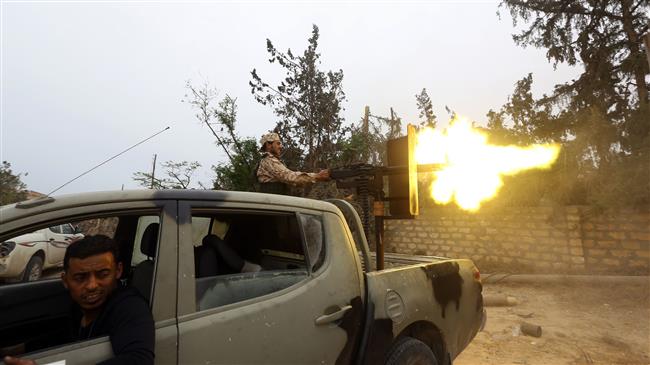UN says countries still violating arms embargo on Libya
The United Nations (UN) says violations of the arms embargo on Libya continue despite agreements reached by concerned parties at a peace summit in Berlin last week.

The UN said in a statement on Saturday that “several” countries that had participated in the peace summit for Libya in Germany on January 19 and had agreed to respect the existing arms embargo on the North African country were still violating it.
The general agreement signed by 16 states and organizations in Germany laid out plans to monitor the arms embargo’s implementation in Libya.
“The United Nations Support Mission in Libya (UNSMIL) deeply regrets the continued blatant violations of the arms embargo in Libya, even after the commitments made in this regard by concerned countries during the International Conference on Libya in Berlin, held on 19 January 2020,” the statement said.
“Over the last 10 days, numerous cargo and other flights have been observed landing at Libyan airports in the western and eastern parts of the country providing the parties with advance weapons, armored vehicles, advisers and fighters,” the statement added.
UNSMIL said it “condemned” the violations, which it said “risk plunging the country into a renewed and intensified round of fighting.”
But it stopped short of naming the countries it blamed for the violation of the arms embargo.
The participants of the Berlin conference included Russia, Turkey, Egypt, the United States, the European Union, and the African Union.

Foreign powers call for ‘permanent’ Libya ceasefire, vow end to foreign interferenceForeign powers have agreed on the need for a
Since 2014, Libya has been divided between two rival camps — the Tripoli-based government of Prime Minister Fayez al-Sarraj, and a camp in the eastern city of Tobruk, supported militarily by rebel forces under the command of Khalifa Haftar.
Haftar receives support from Saudi Arabia, the United Arab Emirates, and Egypt.
In April, Haftar’s militia forces launched an assault on the capital to unseat Sarraj’s internationally-recognized government, which is supported by Ankara.
Turkey has approved plans to send troops to Libya following a military agreement reached with Tripoli. However, a day after the Berlin summit, Turkish President Recep Tayyip Erdogan said that Ankara was yet to send the troops to war-torn Libya, stressing that his country had so far only deployed military advisers and trainers there.
Libya plunged into chaos in 2011, when a popular uprising and a NATO intervention led to the ouster of long-time dictator Muammar Gaddafi and his execution by unruly fighters.







